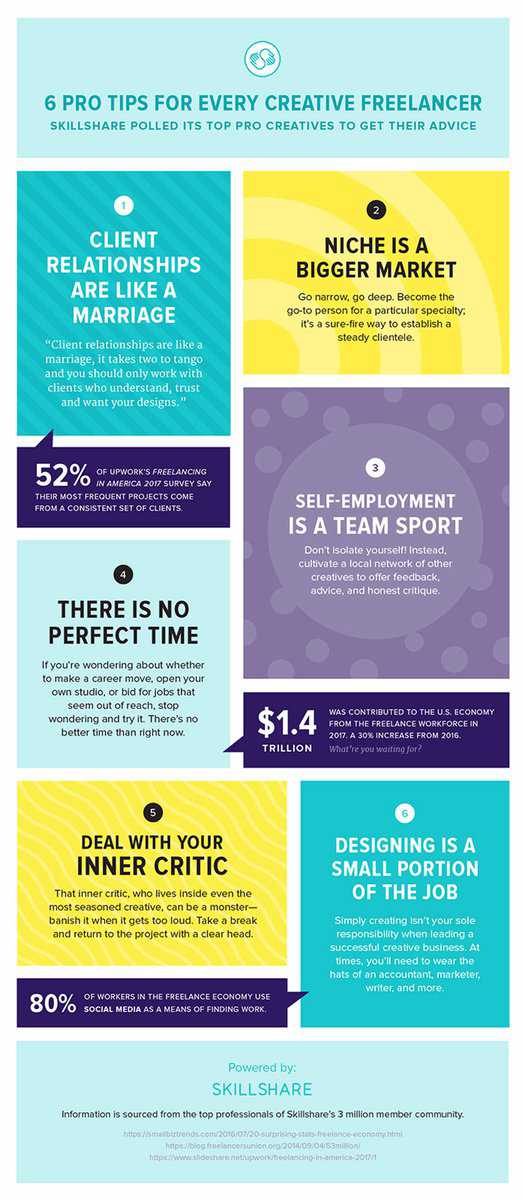New entrants into any line of work have one thing in common: they don’t know what they don’t know. Being a creative freelancer is no different. What is different with creative freelancing though is the fact that freelancers are often flying solo and so seldom get the kind of guidance and mentorship that is often available in other work arrangements.
The Skillshare community consists of more than 3.5 million people worldwide–many of whom are creative professionals working independently. This season we asked our top professional freelancers, both self-taught and formally educated, to answer one question:
What do you wish you had known in advance before or while pursuing a professional design/creative career?
 Cutting edge payroll software
Cutting edge payroll software
- Powerful and easy to use
- HMRC & RTI compliant
- Used by payroll pros
 The CRM platform to grow your business
The CRM platform to grow your business
- Great for entrepreneurs
- Powerful data analytics
- Manage sales and data
 Powerful web builder and advanced business tools
Powerful web builder and advanced business tools
- Great for startups
- Powerful web page builder
- E-commerce available
 Supercharged content planning
Supercharged content planning
- Great for marketing
- Better than lists or sheets
- Manage social media
 Create a new website in 10 minutes. Easy.
Create a new website in 10 minutes. Easy.
- Launch your website fast
- Powerful data intuitive
- No coding skills needed
– Here are our community’s answers, coming from graphic designers to illustrators to freelance writers, distilled into six main points so that you can navigate your freelance career with the inside knowledge that our community earned through years of experience.
1. Client relationships are like a marriage.
“It takes two to tango. Work with clients who understand, trust, and want your designs,” said one respondent. There are some predictable stages of working with a client over the long term, starting with the honeymoon phase where you are thrilled to win the account and where the client is equally excited to have you on board. With a bit of luck, this period can last for years. But once you’re comfortable with each other, some differences of opinion are bound to crop up, and at this point, proper communication, great listening skills, and a degree of flexibility are needed on both sides to avoid a messy divorce.
2. Niche is a bigger market.
The phrase “Go narrow, go deep,” is especially pertinent in creative fields—being a specialist rather than a generalist puts you in a better position for consistent work. “Specializing or choosing a niche for your practice does not limit your options,” read one respondent. “In fact, it creates more abundant opportunity.” A focused approach to a single type of work allows you to bring a great deal of accumulated insight and expertise to each new project, and lets clients know that you’re well equipped to handle anything they might throw your way.
3. Self-employment is a team sport.
One participant told us, “I wish I’d realized early on how important it is to surround yourself with like-minded people. Being self-employed is an isolated job, but there are plenty of other people doing the same thing, and you can all share the ups and downs, ideas and opportunities.”
There’s no reason the self-employed have to forego the kind of social interactions that take place in an office; cultivate a local network of other creatives to offer each other feedback, advice, and honest critique. The prevalence of co-working spaces makes this simpler because creatives tend to cluster in the same buildings where cross-pollination becomes not only inevitable but fun, too. Some of the best ideas are sparked over lunch.
4. There is no perfect time.
“I wish I’d known earlier that I didn’t have to be perfect or know everything to make a start,” is an oft-heard lament in the creative world. So much can be learned through on-the-job experience, observation, and by simply asking a few questions of your friends in the industry that there’s no reason to wait to make a career move, open your own studio, or bid for jobs that seem a bit out of your depth. In fact, those are often the most exciting projects because they force you to grow instead of sticking to your comfort zone.
6. Deal with your inner critic.
“I find it helpful to remind myself that even my favorite illustrators have an inner critic, it’s a normal part of a creative life,” said one respondent. “When mine gets too loud, it’s usually a sign that I need to take a look at my approach and try something else.” Rather than get beat up by your inner critic when you’re in the weeds, cut yourself some slack, take whatever kind of break works best for you (cup of coffee? A quick walk around the block?), and return to the project with a clear head.
7. Your work is a small portion of the work.
A designer told us, “I do much more accounting, client relationships, or other tasks outside of design. Designing is a small portion of the job as an independent.” Simply creating isn’t your sole responsibility when leading successful creative business. At times, you’ll need to wear the hats of an accountant, marketer, and more.
Even experienced freelancers sometimes find themselves stumped by questions on everything from pricing structures to intellectual property concerns to taxes. Perhaps the most valuable thing to keep in mind is that you aren’t in this alone — you can ask more seasoned colleagues for advice with tricky situations. Someone lent them a helping hand along the way too, once upon a time, and they will gladly pay it forward.


